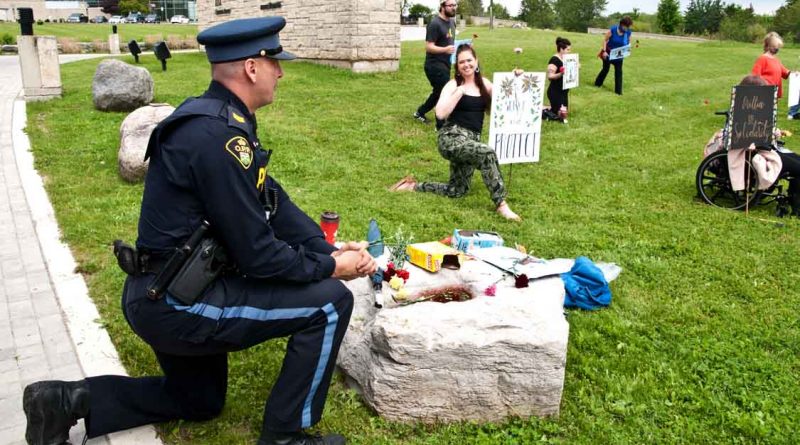Protest At OPP General Headquarters
By John Swartz
While America is burning and Canadians watch, some people are feeling the need to show support for American protesters, and some people feel the need to express personal experience and voice it.
Protests can go in several directions, often away from the one intended. A different point of view emerged Wednesday afternoon at a protest in front the OPP general headquarters on Memorial Avenue by people supporting American protesters who want policing reforms.
Tara Langille and Alexandria Shennett decided to organize the protest only 24 hours earlier.
“Alex came into my work and asked me if I wanted a George Floyd poster. I told her I was about to head out on my lunch break if she wanted to meet me beside my van in the parking lot. We were just talking back and forth about how we felt really helpless about what to do, so we decided to come together and organize this. We decide even if it was just the two of us we would stand here united together and we’re really grateful for the turnout we’ve had.”
They publicized the protest with a Facebook event page and asked people to take time between 11 a.m. and 2 p.m. Wednesday, and by 12:30 p.m. 15 others had joined them. They did not contact the OPP beforehand, but the OPP did make inquiries about what was happening.
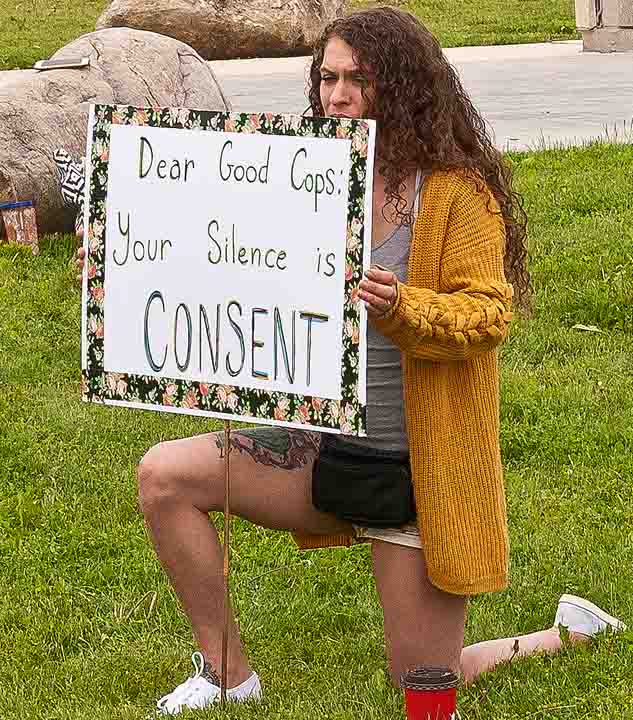
“They asked what we were here for and they basically asked us what was the cause was we were representing here today,” said Langille. “We explained the Black Lives Matter movement and how we are participating in whatever way we are able with the resources we have. After explaining we just asked them if they would come and join us, we’re just out here waiting for that to happen.”
As the event got underway, the OPP’s most famous officer, Sgt. Kerry Schmidt, pulled up driving an OPP van. He was in Orillia to attend a meeting at general headquarters.
“I’m interested to see what they are doing,” said Schmidt. “It’s funny, in my community there was a single person at the side of the road holding up a Black Lives Matter sign. I pulled up beside him, in my police vehicle, and he goes, “Am I doing something wrong?” I said, “No not at all. You are totally fine to do whatever you want.” I asked him if he was getting any responses from the community and he said, ‘Yeah, people are giving me a couple honks,” and I gave him a couple honks myself.”
Almost simultaneously, Daniel Tucker, a local activist who spoke convincingly at last summer’s climate rally at City Hall, arrived. He had a bullhorn and addressed everyone else in general. The former OD/Park Secondary School student has lived in Orillia most of his life and is Black. A passionate anger he carries followed quickly on his opening remarks, culminating in this exchange with Schmidt.
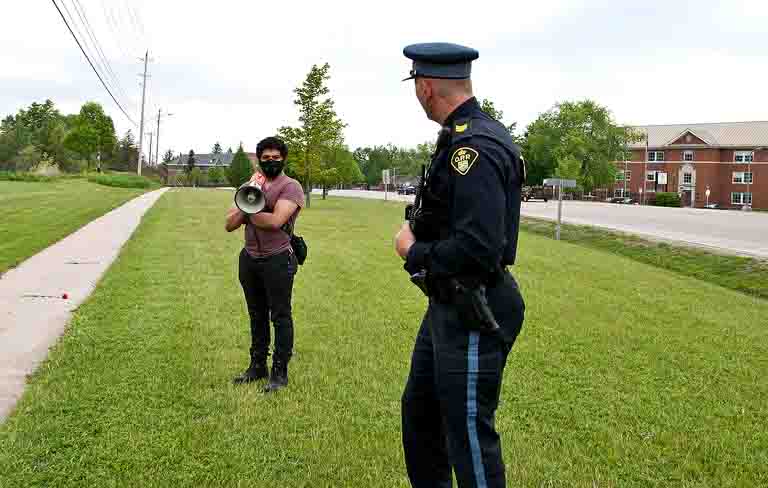
“That’s the reality we that we face every single day,” Tucker said to the protesters. “It’s an understanding that the police force serves a racist principal. It’s an understanding that there is systematic injustice happening and systematically Black people are being punished for being Black.”
“When somebody says ACAB, it stands for All Cops Are Bastards, sorry (toward Kerry) I’m not, I’m really not…”
“Are you talking to me?” said Schmidt.
“Yes,’ said Tucker
“Did you mean that about me?” said Schmidt
“Yes, absolutely,’ said Tucker
“I don’t feel that about you though.” said Schmidt
“That’s cool. I’m a Black guy and that’s what we think,” said Tucker
“OK. So how do I change your perception?” said Schmidt
“Quit,’ said Tucker
“You want me to quit?” said Schmidt
“Yeah,” said Tucker
“And do what?” said Schmidt
“I don’t know. Work for homeless people,” said Tucker
“You know what? I spent the night in a homeless shelter about two months ago getting the experience of what it’s like to live in a homeless environment and it’s shocking and I think I have a voice here. I can help people get messages out,” said Schmidt
“That’s great, because policing doesn’t actually help people,” said Tucker
Tucker then turned his attention back to the protesters.
What Happened Next
“I’m not just a random guy talking about random stuff. I’m actually representing a movement, this movement is ACAB” Tucker continued. “This movement says we don’t feel like getting murdered anymore and it has to have a few million people protest to have our voices heard. We tried kneeling and you all didn’t like that.”
He then referenced an encounter with the OPP he said happened earlier that day.
‘I want to tell you about my experience today. Today I thought I was going to get shot. I have a gasmask in my car, military grade, because, you know, that’s what’s going on in the States. People are dying, people are getting shot.”
He did not elaborate further what occurred with his morning encounter with police.
Schmidt’s Take
Speaking with SUNonline/Orillia, Schmidt took it in stride.
“Everyone has the right to peacefully protest and raise awareness on what their views are. Obviously we want to make sure it’s safe and that’s what our job is to do,” said Schmidt. “Everyone is entitled to their opinions and their perceptions and unfortunately we have to work together with their support, not unfortunately, but…”
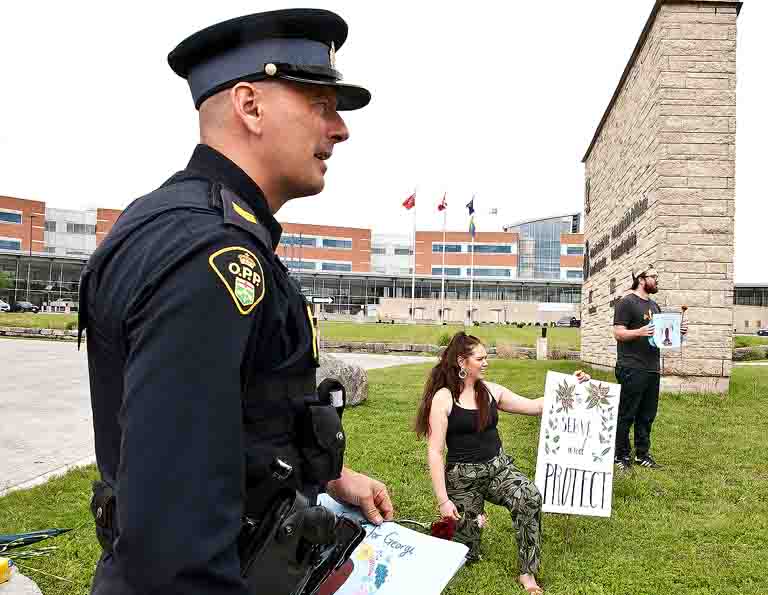
We were interrupted by the protesters asking Schmidt to join them and take a knee, which he did. Then spoke to the group.
“I kneel with you as well,” said Schmidt. “Have yourself a wonderful day and I don’t want to be considered the bastard you called me.”
“I’m glad you said that,” said Tucker. “Because I wanted to say cops are kneeling, representing, you know, we were sorry for killing you every single day and we’re sorry that you live in fear and you are going to get shot every day because statistically speaking, I’m surprised I’m still alive living in Orillia.”
Before departing Schmidt took a few minutes to speak again with SUNonline/Orillia about the encounter with Tucker.
“I think every situation is dynamic, is different and we’re seeing the protests that are happening all around America and in Canada as well and obviously we want people to respect people’s property and we don’t want to see violence in these kinds of activities and these protests. Everyone has the right to peacefully protest and no issue with that. What’s going on here right now, there’s not issues with them participating and getting their voices heard and messages out,” said Schmidt.
Schmidt was asked about how he felt about with was said specifically about him.
“It’s small little connections, small little bridges. I wish I could build a bridge to what that gentleman was talking (about), but obviously he doesn’t want to hear from me, but everyone has their own perceptions and issues and we certainly want to make sure we are doing our thing.”
Tucker’s Explanation
Tucker spoke with SUNonline/Orillia about how he arrived at his point of view. While there have been incidents of racist violence across Canada over time, it would be fair to say in modern times here in Orillia few people would have any knowledge of such an incident occurring toward Blacks.
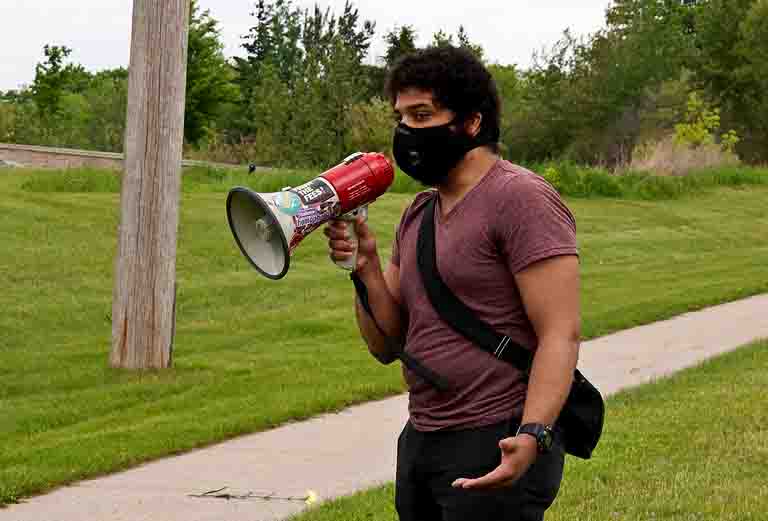
“It’s something that I face every day. Every time I see police right behind me, or I’m talking to a police officer all I’m thinking is if he thinks I move to fast, or I reach into my bag, I always got to keep my hands visible; these are the things that are going through my head. I’m just terrified. I know when other people are being stopped by the police their thinking is what did I do?” said Tucker.
“I’m thinking about, how am I going to make sure I’m going to survive this encounter?”
“Not that I’ve been in trouble.”
“I’ve dealt with my fair share of police officers. It’s always the same thing.”
His anger seems to stem from an accumulation of personal experience and what he sees from other places in the news – and of course particularly what we are all witnessing each day for the last week from the United States. Many Black people are feeling able to say what they’ve kept to themselves with the strength of numbers of voices present today. He concedes on a one to one basis there are exceptions, but the lack of accountability for bad behavior is still a reflection of the whole.
‘I think a lot of cops, they’re nice people. I wanted to be a police officer when I was little, but I’m not going to do that anymore,” Tucker said. “Police officers can be nice but that doesn’t change the fact that they are representing these systematic injustices and they stand for it every single day. A good way to represent that, if you have 13 bad cops and 1,000 good cops, and the 1,000 good cops don’t make sure those 13 bad cops aren’t doing bad things, then you have 1,013 bad cops. That’s the whole thing of ACAB, every single police officer, regardless of whether they are nice or not, is upholding these systematic injustices, is perpetrating this racism.”
Nevertheless, he believes issues are deeply rooted in historical practice. The Candian experience may not be the same magnitude as south of the border, but to him, it’s still an issue.
“Yeah, absolutely it’s a different experience, (but) there’s still the same stuff going on,” Tucker said. “Canada’s biggest implicational racism, whether Indigenous communities, Black communities, basically any minority community, it’s based on systematic oppression.”
SUNonline/Orillia asked if his expression of anger at the protest was maybe a symptom of what many others feel in light of the continued brutality seen the last week – despite police brutality being the entire reason people are demonstrating – and the events are happening in another place with a different approach to policing; that what was simmering for years is now boiling over.
“Yeah, absolutely. It’s not necessary that it’s boiling over, but I’m getting the global attention. It’s like the world is finally looking at it through the eyes of a Back person living in Black America. It’s not that it’s finally getting to the point where I’m finally standing up about it, it’s that the world is finally listing. It’s good to see and I hope that it doesn’t just fall through,”
The Reaction From An Organizer
Alexandria Shennett had thoughts regarding what transpired between Tucker and Schmidt.
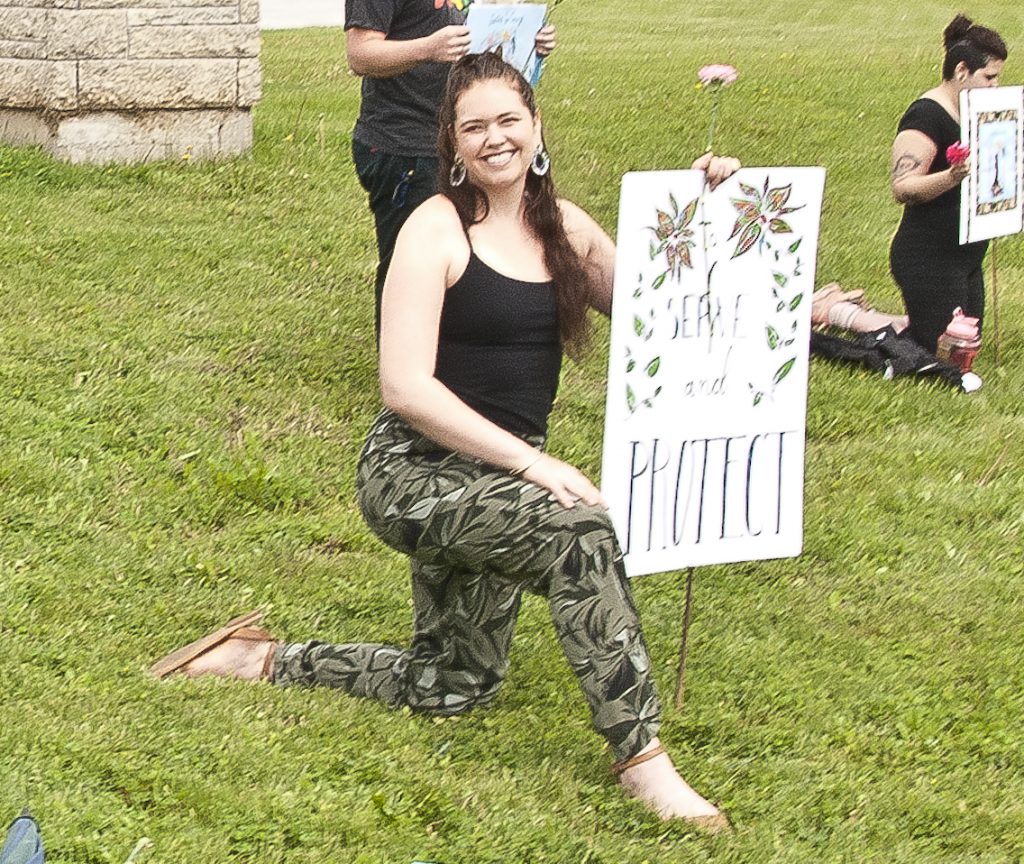
Alexandria Shennett
“Solidarity, that was our goal here. We’re not blaming anybody.” Shennett said.
“We know our problems in Canada are different than in the States, but we want to make sure that everybody knows we’re looking out for them and we’re going to be here. When the tone (of Tucker’s words) got a little darker, it scared me a little bit to be honest. I have no hard feelings because I can’t imagine what it would be like to walk out of your house every day to go for a walk, to go for a run, and worry for your life. I would be angry and I am angry and I can leave my house and not worry about being shot. I understand the anger.”
“Yes a police officer kneeled with us, but it’s a systematic problem and it’s a problem with the structure of the system of the whole. Of course there are going to be officers to kneel with us and support our cause, but until there’s change from up above and the politics are changed and we vote in people who are going to make those changes, we’re still going to see that systematic racism.”
‘Officer Kerry Schmidt, I see that that’s a good man right there. I understand that and I didn’t think he deserves to be called a bastard, but I do think there’s a systematic problem and a couple officers kneeling with us isn’t going to fix the problem. It needs to come from above.”
It is clear there are different reasons people have for publicly protesting at this moment. Actions are dependent on one’s own experience, or empathy. A combination of things are converging to create the conditions for protest, and protests are planned in other major cities across Canada this Saturday, which may result in another protest in Orillia.
(Photos by Swartz – SUNonline/Orillia)

